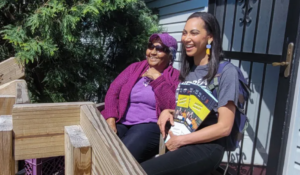Test scores go up when students stay with the same teacher

A new study based on Indiana data found that students who stayed with the same teacher for consecutive years improved their scores on the ISTEP, the state’s standardized test used through 2018.
The practice of rematching students with teachers over two years led to stronger classroom relationships, which in turn led to a small but notable increase in math and reading scores, the study found.
The positive effects were even more pronounced for students from historically underserved groups, said study author NaYoung Hwang, a postdoctoral fellow at the University of Missouri’s Truman School of Public Affairs.
Hwang said previous research has suggested there could be many reasons for the correlation. Newcomer students, for example, may face linguistic and cultural barriers that hamper a connection to their teachers — barriers which could be reduced with more familiarity.
“For low-achieving students, it’s important for teachers to know why they’re struggling and the best way to support them,” Hwang said. “Are they hungry? Maybe they have certain behavior issues because of their home environment. Maybe their parents got divorced, or there’s some kind of abuse.”
Hwang said her work used a larger sample size to expand on previous research around the country that has touted the benefits of rematching. Her study included 903,738 Indiana students and 31,235 teachers in grades 3 through 8 over seven years.
Hwang’s study, published in The Economics of Education Review, found that 9.2% of students and 22.2% of teachers experienced rematching at least once, though the practice is “relatively uncommon.” Rematched students tended to be male, white, higher-achieving, and not eligible for subsidized lunch, while rematched teachers were more likely to be female, white, and more experienced than their peers who did not rematch.
Students who had Individual Education Programs were also more likely to rematch with teachers, which the study states could “reflect a concerted effort to rematch IEP students, or it could be a byproduct of teacher availability.”
The study notes that student-teacher rematching is a key component of the practice commonly known as looping, in which entire classes move up to the next grade with their teacher.
While other studies have suggested that rematching matters most to young students who are outside of their family setting for the first time, Hwang said her research showed students up to eighth grade also benefit from the practice.
“In the face of generally weakening relationships with adults, older students may stand to gain more at the margin from being closer with their teachers,” the study says.
“Our finding that rematching positively affects student achievement in higher grades is notable because policies designed to increase student-teacher rematches are less-costly to implement—and thus more feasible—in higher grades.”
Hwang said teacher rematching is easier in middle school because teacher specialization is much more common in those grades. When teachers only teach one subject, it may be easier to assign them to multiple grades.
The study concludes that with “all else equal, increasing student-teacher rematches will yield improvements in student achievement,” and that it’s worthwhile for schools to pursue “low-cost and non-disruptive policies that facilitate more student-teacher rematching.”
But it also acknowledges that the improvements are relatively small, and that more disruptive changes for the sake of matching would come with tradeoffs.
Hwang said that like most education policies, rematching shouldn’t be considered a one-size-fits-all solution to student achievement. Among its drawbacks is that keeping students with one teacher may prevent them from experiencing different teaching and learning styles with another teacher.
There could also be a mismatch between students and teachers, Hwang added.
Instead, Hwang said her research supports the broader conclusion that schools should emphasize policies that support strong classroom relationships.
“Any practice that can enhance those student-teacher relationships is worth exploring,” Hwang said. “We’re humans, and we want to connect.”
This article was originally posted on Test scores go up when students stay with the same teacher





